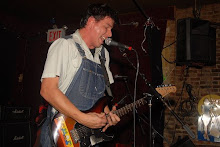
Béla Bartok
Dance Suite
Gyorgi Kurtág
Op. 42 .concertante. (dedicated to Hiromi Kikuchi & Ken Hakii)
Jean Sibelius
Symphony No.6
Symphony No.7
Hiromi Kikuchi, violin
Ken Hakii, viola
BBC Symphony Orchestra
Jukka-Pekka Saraste, conductor
16 December 2011
Live BBC broadcast from The Barbican Centre, London UK
Radio announcements by Martin Handley
If you like the Kurtag work (if?? Did I write IF?) buy it.
earbox brought this to ca, and I couldn't help it. I had to share.
Here is a whole broadcast of a BBC concert including .concertante.. It comes complete with the 26-some minute radio interval and all, nicely tracked by a concertarchive uploader so as not to overly tax your repeated-listening possibilities.
In the announcer's comments, they tell of an affectionate bond between Gyorgy Kurtag and the violinist Hiromi Kikuchi. Kurtag is said to hold her and her spouse as the artists he "trusts most in the world". Indeed, Senor Kurtag has written other things for her such as "Hipartita", and in this piece the dedication is to both her and her husband, Ken Haikii. The two played .concertante. on this evening's recording, performing on their customary violin and viola as well as on 'silent violin and silent viola' which look like "skeletal, half" instruments. These come to bear in the fading last pages of the vast, intimate work.
I really love the two Sibelius symphonies given here, almost regardless of performance, and Bartok is just a constant love but really this is for the greatest love of them all, for Kurtag. I just keep coming back to György and his work keeps revealing more. So, although the whole concert is here, it is for a sense of completion. Besides (as Mesopotamian-era religion points out), hell, why not?
Christopher Gunning has given it a different framing altogether:
"...The [BBC's] programme note waffled about Mozart’s Sinfonia Concertante, and references to Wagner and Magyar music, but if I was supposed to recognise any of these, I’m afraid I failed miserably. In fact I found this work altogether perplexing; the soloists are not soloists in the conventional sense, and their contributions often seemed inconsequential or inaudible. The music is also extremely discontinuous; at worst it felt like a random series of sounds and gestures, which although frequently interesting in themselves, were largely disconnected. There are welcome periods of greater energy, and some violent outbursts too, but overall this doesn’t make for coherent, let alone pleasant, listening. You may say there’s absolutely nothing wrong in that in itself, of course, but there’s a point at which incomprehension gets the better of me and I must admit to being pretty relieved when it was all over..."
I have to admit, this is exactly one of the central reasons as to why I love Kurtag. Not everybody will like it. And that is OK. I personally find the composer's work to be unflinching and with that, more beautiful. Also (hey, it's a blog, so if it turns into a quotefest just strap in), here I present Tia DeNora's quoting of John Cage most fittingly:
New music:new listening. Not an attempt to understand something that is being said, for, if something were being said, the sounds would be given the shapes of words. Just an attention to the activity of sounds."
Musicweb's Philip Borg-Steely has written something about this work which gets Kurtag in general:
"...Spare, elliptical, austere, Kurtág’s aphoristic pieces or movements, in which no note is wasted or insignificant, create an impact and resonance out of all proportion to their brevity. After listening to one of his typically concentrated works, one may well find much other contemporary music long-winded and self-indulgent..."
Allright then.
Guillermo






























